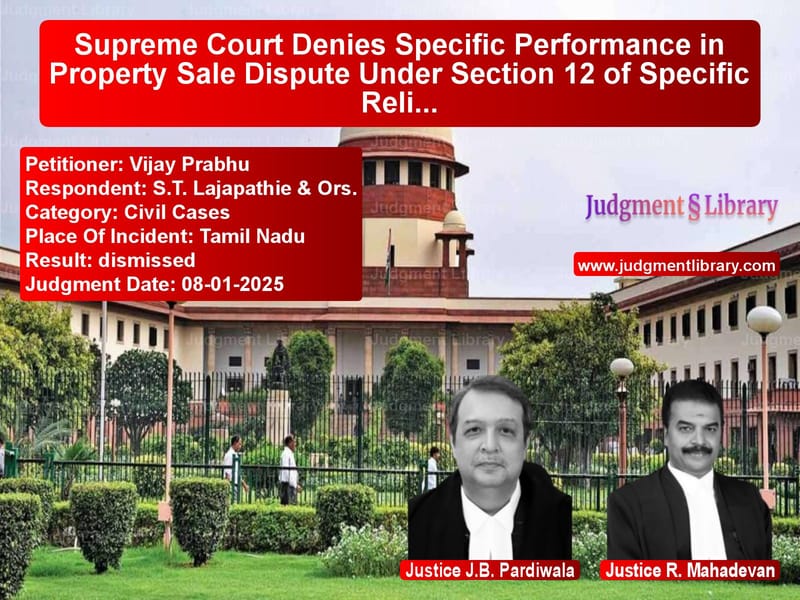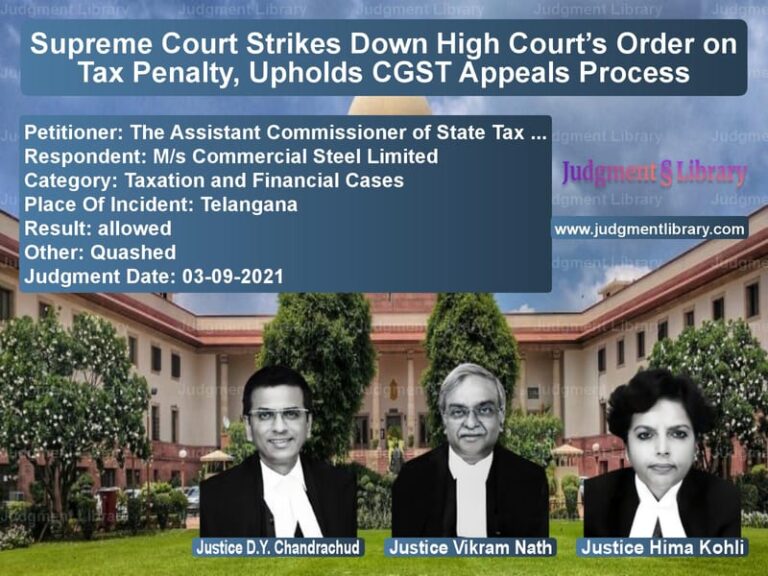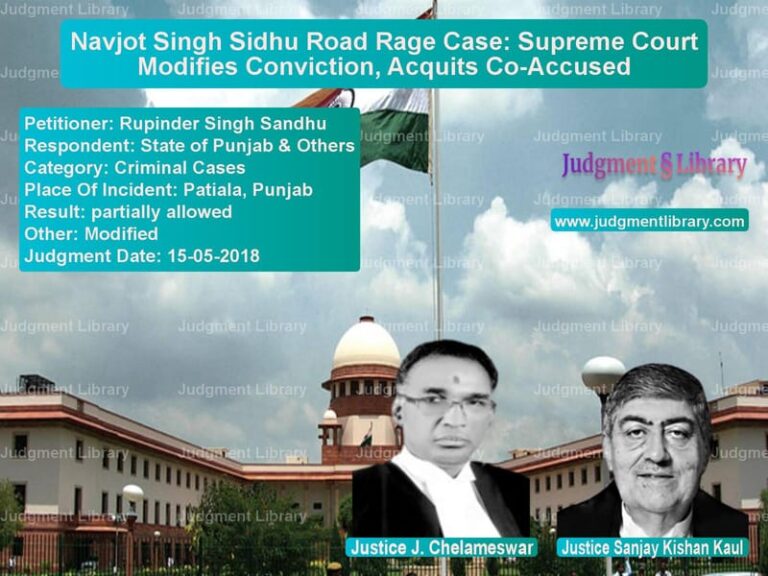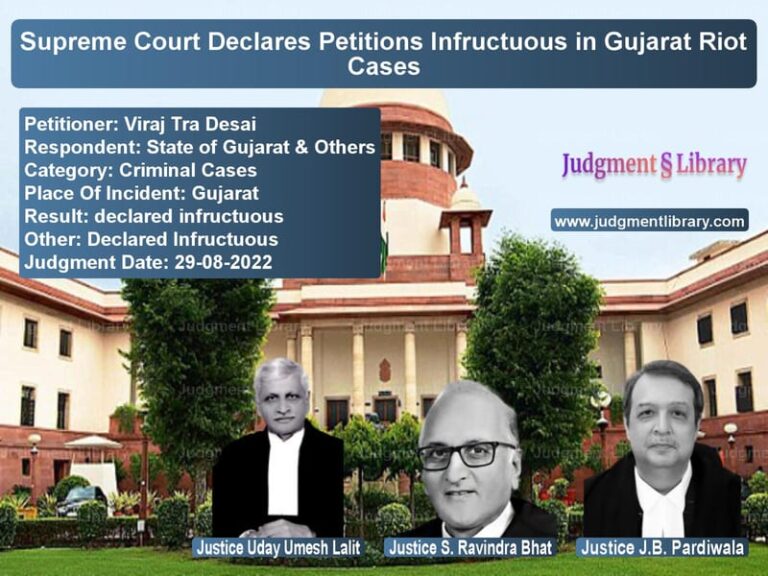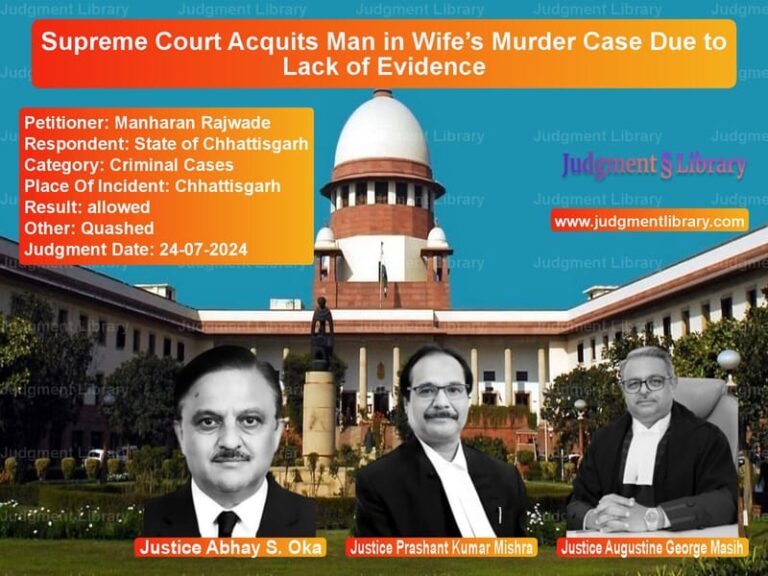Supreme Court Denies Specific Performance in Property Sale Dispute Under Section 12 of Specific Relief Act
The Supreme Court of India, in Vijay Prabhu v. S.T. Lajapathie & Ors., delivered a critical ruling on the limitations of specific performance in property agreements, particularly under Section 12 of the Specific Relief Act, 1963. The Court denied the petitioner’s claim for specific performance and upheld the alternative relief of refunding the earnest money with interest.
Background of the Case
The case originated from a property sale agreement dated November 7, 2005, between the petitioner (plaintiff) and the respondents (defendants). The plaintiff sought specific performance of the contract or, alternatively, a refund of ₹20,00,000 with damages of ₹40,00,000 plus interest at 12% per annum.
Key Events
- The trial court ruled against specific performance and directed a refund of ₹20,00,000 with interest.
- The plaintiff appealed to the High Court of Madras, which dismissed the appeal, affirming the trial court’s ruling.
- The plaintiff then approached the Supreme Court, seeking specific performance or higher damages.
Legal Issues Raised
Petitioner’s Arguments
The petitioner (original plaintiff) contended that:
- He was entitled to specific performance under Section 12(3) of the Specific Relief Act.
- The High Court failed to consider his willingness to relinquish certain claims to enforce the agreement partially.
- He had made substantial payments and suffered financial losses due to the defendants’ non-compliance.
Respondents’ Arguments
The respondents (original defendants) argued that:
- The plaintiff was not ready and willing to perform his obligations under the contract.
- He failed to pay the remaining balance of ₹64,00,000.
- Specific performance could not be granted as the contract terms were not separable.
Supreme Court’s Analysis
Interpretation of Section 12 of the Specific Relief Act
The Supreme Court analyzed the scope of Section 12, which governs specific performance when only part of a contract can be fulfilled. The Court noted:
- “A contract cannot be partially enforced unless the remaining obligations are minor or separable.”
- “The petitioner had not deposited ₹64,00,000, making him ineligible to invoke Section 12(3).”
- “If the plaintiff cannot fulfill his part of the contract, the court cannot direct specific performance.”
Deficiencies in the Plaintiff’s Case
The Court found multiple deficiencies in the plaintiff’s claims:
- “The plaintiff failed to demonstrate financial readiness to complete the transaction.”
- “The contract terms were not separable, meaning the plaintiff could not selectively enforce favorable terms.”
- “Specific performance is discretionary and not an absolute right.”
Discretionary Nature of Specific Performance
The Court emphasized that specific performance is not granted automatically:
- “Section 12(3) does not provide an unconditional right; courts exercise discretion based on the contract’s nature.”
- “The trial and High Court had correctly denied specific performance due to the plaintiff’s inability to fulfill financial obligations.”
Key Precedents Cited
The Court relied on several precedents:
- Jaswinder Kaur v. Gurmeet Singh (2017) 12 SCC 810: Specific performance cannot be granted if the plaintiff is in default.
- Abdul Rahim v. Maidhar Gazi (1928): Courts do not grant specific performance when non-compliance arises due to the plaintiff’s own conduct.
- Kalyanpur Lime Works v. State of Bihar (1954): Relinquishment of claims can be made at any litigation stage.
Final Judgment
- The Supreme Court dismissed the petition, denying specific performance.
- The refund of ₹20,00,000 with 12% interest was upheld.
- The Court clarified that Section 12 relief cannot apply if financial obligations remain unfulfilled.
Implications of the Judgment
This ruling reinforces several legal principles:
1. Limitations on Specific Performance
Court-ordered enforcement of contracts is discretionary and depends on the plaintiff’s ability to perform obligations.
2. Strict Application of Section 12
Partial performance relief applies only when contract terms are separable and financial obligations are met.
3. Readiness and Willingness Principle
Litigants must prove financial capacity and genuine intent to complete agreements.
This judgment strengthens contract enforcement standards while ensuring fair outcomes in real estate disputes.
Petitioner Name: Vijay Prabhu.Respondent Name: S.T. Lajapathie & Ors..Judgment By: Justice J.B. Pardiwala, Justice R. Mahadevan.Place Of Incident: Tamil Nadu.Judgment Date: 08-01-2025.
Don’t miss out on the full details! Download the complete judgment in PDF format below and gain valuable insights instantly!
Download Judgment: vijay-prabhu-vs-s.t.-lajapathie-&-or-supreme-court-of-india-judgment-dated-08-01-2025.pdf
Directly Download Judgment: Directly download this Judgment
See all petitions in Specific Performance
See all petitions in Contract Disputes
See all petitions in Property Disputes
See all petitions in Judgment by J.B. Pardiwala
See all petitions in Judgment by R. Mahadevan
See all petitions in dismissed
See all petitions in supreme court of India judgments January 2025
See all petitions in 2025 judgments
See all posts in Civil Cases Category
See all allowed petitions in Civil Cases Category
See all Dismissed petitions in Civil Cases Category
See all partially allowed petitions in Civil Cases Category

